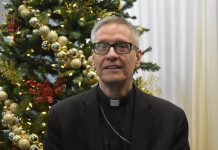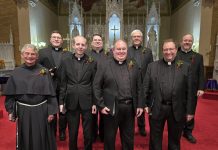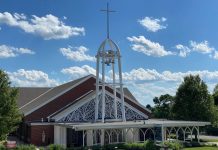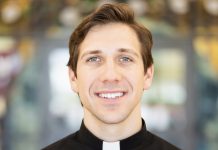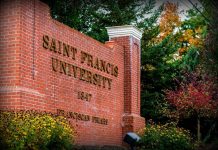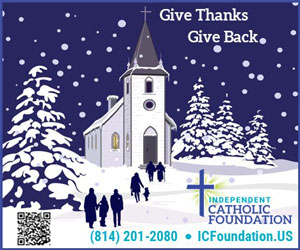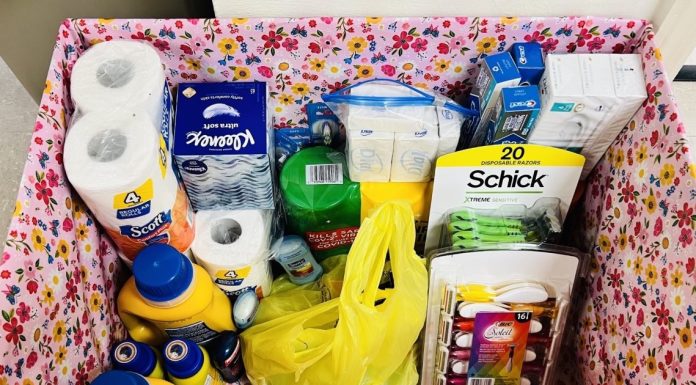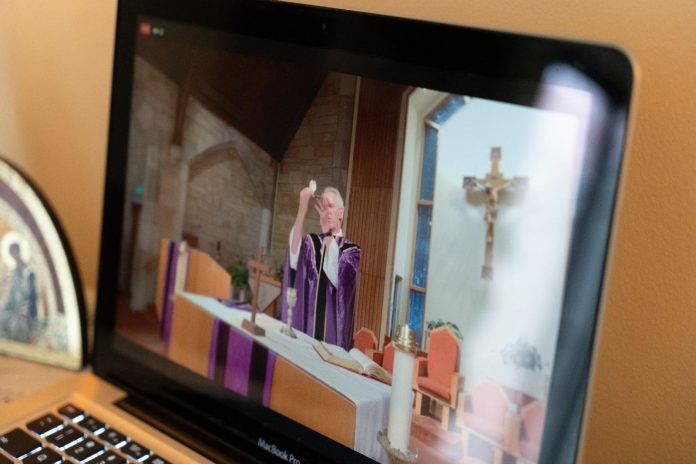
By Dennis Sadowski
CLEVELAND (CNS) — The coronavirus pandemic may have led to debilitating isolation among Catholics, but it has not lessened people’s hunger for the Eucharist, bishops across the country said.
In a 45-minute online discussion Nov. 17, bishops described an unwavering thirst for the Eucharist, detailing some of the extraordinary measures people have taken to worship before the Blessed Sacrament.
They talked about the impact of the coronavirus on local church communities as part of the second day of the U.S. Conference of Catholic Bishops’ fall general assembly, which this year was livestreamed due to the pandemic.
“The power of the Holy Spirit is living in the hearts of the faithful,” said Bishop David P. Talley of Memphis, Tennessee.
“People are expressing such a deep love and devotion to the Eucharist,” added Archbishop John C. Wester of Santa Fe, New Mexico.
And in the Diocese of Brownsville, Texas, Bishop Daniel E. Flores described how he has arrived at parishes to see people kneeling outside, praying for the chance to receive holy Communion and the return of normal worship experiences.
“This is the renewal that I find very personally edifying and a source of great strength,” Bishop Flores said.
Bishop Kevin W. Vann of Orange, California, described the same scene of people kneeling in the rain early one morning waiting for Christ Cathedral to open.
Hispanic communities have been particularly hard-hit by the inability to attend Mass, he said, explaining how he will travel to visit small groups of people on Sundays.
Several bishops said such yearning for the Eucharist presents an opportunity for the church to begin a new effort of evangelization and catechesis as the public celebration of Mass gradually expands and church leaders determine how best to encourage people to reengage in parish life.
Bishop James S. Wall of Gallup, New Mexico, described the challenges of ministering in a diocese that spans two states — part of New Mexico and part of Arizona — and in which Native America reservations encompass 62% of lands. While lockdowns may have eased in some communities, he said, the reservations remain under stricter limits because of higher rates of infection and death, compounding the inability of Catholic Native Americans to worship.
“I would say if there’s one grace that I’ve seen come out of this, it’s a greater love for the Eucharist. … I think this absence of the Eucharist has really created a longing, a hunger, a desire on behalf of our people,” he told the assembly.
The pandemic also has given Bishop Wall the time to develop a pastoral letter on the Eucharist, which he plans to release in Advent or early in 2021.
Archbishop Paul S. Coakley of Oklahoma City, chairman of the bishops’ Committee on Domestic Justice and Human Development, opened the discussion by explaining how he has seen the Holy Spirit working among lay leaders, clergy, women religious and parish organizations to continue various ministries.
He described a “new awareness that we need to be a more evangelizing church.”
Another prelate, Auxiliary Bishop Robert E. Barron of Los Angeles, chairman of the bishops’ Committee on Evangelization and Catechesis, suggested that a national campaign be developed to encourage people to bring someone else with them when they can return to regular Mass attendance.
Across the country, the pandemic has led diocesan leadership to assist parishes adopting new technologies for the livestreaming of Mass, keeping in touch with parishioners, particularly the elderly, and learning how to help people access food and other basic necessities.
Bishop Oscar Cantu of San Jose, California, explained how one pastor conducted “home visits” with parishioners via Zoom.
Bishops continue to schedule regular online meetings with priests in their diocese to learn how they are faring during the pandemic while giving them the opportunity to share ideas on a new style of parish ministry as people remain dispersed and away from their faith community.
In Boston, Cardinal Sean P. O’Malley described how a group of about 30 priests has formed to administer the sacraments in nursing homes and hospitals. The volunteer priests, he explained, remain in isolation to minimize the likelihood of contracting COVID-19, the illness caused by the coronavirus, and to assure to health care providers that they are not carriers of the infection.
Moving forward, bishops acknowledged that the way ministry is conducted will continue to take new forms until the pandemic subsides and people can safely move about freely.
Bishop Joseph J. Tyson of Yakima, Washington, credited Pope Francis for regular reminders that church ministry must adapt in a post-COVID-19 world so that it’s work addresses more than stopping the spread of the virus and begins to better address the causes of poverty, racism and other social sins.


